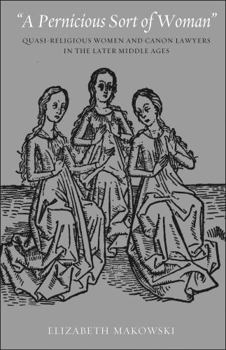A Pernicious Sort of Woman": Quasi-Religious Women and Canon Lawyers in the Later Middle Ages
(Part of the Studies in Medieval and Early Modern Canon Law Series)
WINNER OF THE 2007 HISTORY OF WOMEN RELIGIOUS DISTINGUISHED BOOK AWARD Whether they were secular canonesses or beguines, tertiaries or Sisters of the Common Life, quasi-religious women in the later Middle Ages lived their lives against a backdrop of struggle and insecurity resulting, in large measure, from their ambivalent legal status. Because they lacked one or more of the canonical earmarks of religious women strictly speaking, they had to justify their unauthorized way of life and to defend themselves against association with those who had been branded unorthodox, unruly, or even heretical. Ambiguous legal status within the organized Church and the contests to which it gave rise are a constant theme in the historiography of quasi-religious women, yet there has been no full-scale study of what it meant at law to be a mulier religiosa. This book provides a thorough examination of the writings of canon lawyers in the late Middle Ages as they come to terms, both in their academic work and also in their roles as judges and advisers, with women who were not, strictly speaking, religious, but who were popularly thought of as such. It studies the ways in which jurists strove to categorize these women and to clarify the sometimes ambivalent canons relating to their lives in the community. It assesses, among other things, the extent to which lawyers proved responsive to popular as well as learned notions of what constituted religious life for women when the interests of particular clients were at stake. "A Pernicious Sort of Woman" will be a useful supplement to books devoted to individual quasi-religious women or to specific manifestations of female lay piety. It will be of interest to historians of Christianity and specialists in the law and women's studies as well as anyone interested in the history of religious women. ABOUT THE AUTHOR Elizabeth Makowski is Associate Professor of History at Texas State University. She is the author of Canon Law and Cloistered Women and coauthor of Wykked Wyves and the Woes of Marriage. PRAISE FOR THE BOOK: "This book should help shed light on the context in which women developed their forms of religious life and be of use to historians and those who study particular women or communities that were trying to survive in [the later Middle Ages]."? Magistra "This book is a worthy follow-up to the author's excellent monograph Canon Law and Cloistered Women . . . . There is no doubt that A Pernicious Sort of Woman is a first-rate book. Makowski's story of the formulation, reception, and use of the Clementine decrees on quasi-religious women is a model of how the neglected, 'elephantine literature' of Fourteenth- and Fifteenth-century canon law can be tamed and put to good use. Makowski aimed at a wide scholarly audience and her book hits the mark: a reader ignorant of canon law may take for granted the lucid summaries of texts that can be rather intractable. Those expert in ecclesiastical law will appreciate this achievement all the more, but should also be grateful for the way Makowski smoothly integrated such technical material with one of the hot topics of medieval historiography today: late medieval women's religiosity."?Patrick Nold, Ecclesiastical Law Journal "Elizabeth Makowski brilliantly makes sense of the incongruities between canon law's increasing 'crack-down' on religious women of all sorts and the actuality of increasing numbers of late medieval quasi-religious women. In so doing she has written an essential book for all those embarking on the study of medieval religious women, on the history of canon law, and on the history of those late medieval towns and regions that began to persecute beguines and other religious women. The importance of this study is threefold: it constitutes a valuable introduction to the work
Format:Hardcover
Language:English
ISBN:0813213924
ISBN13:9780813213927
Release Date:May 2005
Publisher:Catholic University of America Press
Length:170 Pages
Weight:0.66 lbs.
Dimensions:0.8" x 6.0" x 8.5"
Customer Reviews
0 rating





